什么是中国式禁闭?
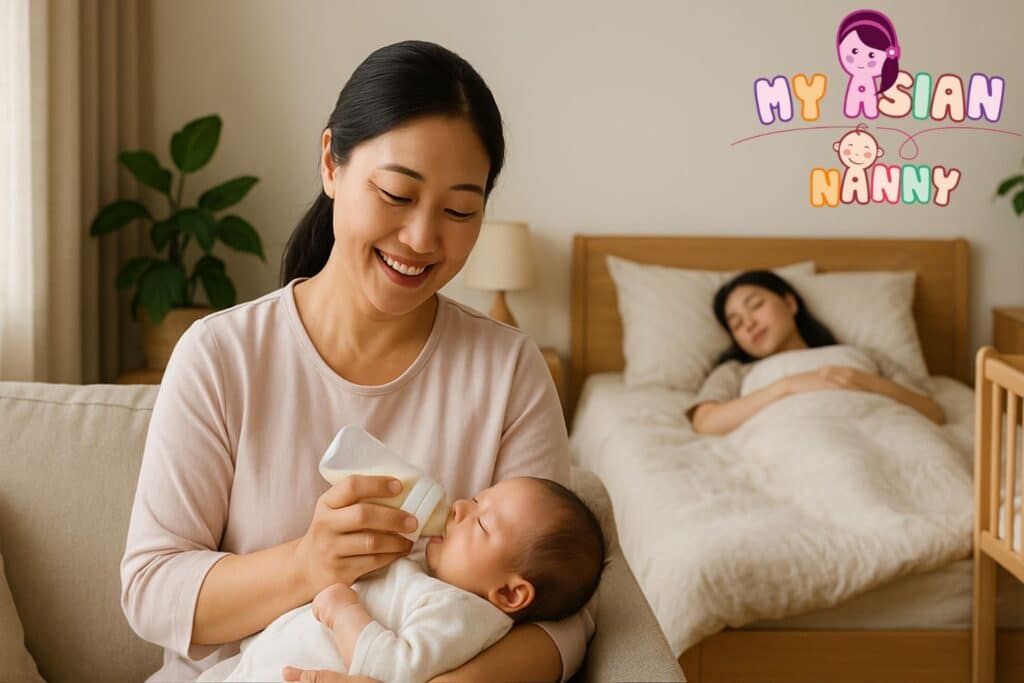
Chinese confinement, known as zuò yuè zi (坐月子) or “sitting the month,” is a well-established postpartum tradition with over 2,000 years of history. This comprehensive practice guides new mothers through the critical 30-100 days after childbirth, emphasizing rest, specialized nutrition, warmth, and dedicated care. The Chinese confinement period refers to this traditional practice, typically lasting from one to three months, and is designed to support both the mother’s recovery and the baby’s early development. Deeply rooted in Traditional Chinese Medicine (TCM) principles, confinement helps mothers recover holistically—addressing physical healing, emotional well-being, and the transition to motherhood.
Whether you’re expecting your first child, supporting someone who is, or simply interested in traditional postpartum care approaches from around the world, this in-depth guide explores every aspect of Chinese confinement. Chinese society has played a significant role in shaping and preserving these postpartum practices, ensuring their continued relevance and adaptation in modern times. From its ancient origins to modern adaptations, we’ve consulted with TCM practitioners, experienced postpartum doulas, and mothers who have practiced confinement to bring you authentic, practical information.
As Western interest in holistic postpartum recovery grows, many parents are discovering the wisdom in this time-honored tradition that prioritizes maternal recovery and newborn bonding in those crucial first weeks. During the Chinese confinement period, special attention is given to the baby’s needs, with practices focused on protecting the baby’s health and supporting the baby’s well-being alongside the mother’s recovery.
您将从本指南中学到什么
什么是中国式禁闭?起源与哲学
Chinese confinement is a comprehensive postpartum recovery system that dates back to the Han Dynasty (206 BCE-220 CE). As a traditional practice, it holds historical significance in Chinese culture for supporting mothers after childbirth. The practice developed from observations that women who rested completely after childbirth seemed to experience fewer long-term health complications than those who resumed activities too quickly. The term zuò yuè zi (坐月子) literally translates to “sitting the month,” reflecting the emphasis on rest and minimal movement during this critical recovery window.
According to Traditional Chinese Medicine (TCM), childbirth creates a significant imbalance in the body’s energy systems. Labor and delivery cause what practitioners call a “great opening” of the body, depleting blood and vital energy (qi) while leaving new mothers vulnerable to harmful elements like cold air and wind. The confinement period is designed to protect mothers after they have given birth, close this energetic gateway, restore balance, and prevent chronic health issues that might otherwise manifest years later.
Over time, the development of this practice has been influenced by both medical theories and cultural transmission, with some customs passed down as wives tales and traditional beliefs.
Traditional confinement practices are specifically designed to support a woman’s recovery after giving birth, emphasizing rest, nutrition, and protection from environmental stressors.
中国式禁闭的核心原则
禁闭哲学围绕四个关键要素展开:
- 恢复平衡–修复分娩过程中被破坏的阴阳平衡
- 抵御环境因素–保护身体免受寒冷、风和潮湿的侵袭
- 补血益气– 通过特定营养素和休息重建生命能量
- 预防未来的疾病– 彻底解决产后康复问题,避免慢性健康问题
历史上,皇家宫廷和普通家庭的产褥期习俗各不相同,皇家宫廷由宫廷医生精心准备仪式和专门食物,普通家庭则由祖母代代相传民间智慧。如今,中国、台湾、香港、马来西亚和新加坡等地的文化中仍然根深蒂固地保留着 “坐月子 “这一习俗,韩国和越南社区对这一习俗的兴趣也与日俱增。
在分娩期间,新妈妈们的传统:
- 待在室内– 待在受控环境中,远离气流、风和温度波动
- 食用温热食物–食用专门烹制的膳食,以驱除寒冷和补充营养
- 避免受寒– 保持温暖,包括限制接触冷水或空调
- 限制体力活动– 尽量减少家务劳动、剧烈运动,甚至阅读
- 接受专门护理–接受有经验的家庭成员或专业分娩保姆的支持
在全球产后护理传统中,中国产褥期护理的独特之处在于其系统性和全面性。它不只关注婴儿,还承认分娩带来的深刻身体变化,并将母亲的完全恢复作为其长期健康和福祉的关键。
今天的年轻父母经常质疑这些传统的科学依据。虽然有些做法已经得到了现代研究的验证,如休息对组织修复的益处和某些营养原则,但其他一些做法仍更多地植根于文化智慧而非经验证据。正如许多从业者现在所建议的,最有效的方法是在传统智慧和现代对产后健康的理解之间找到平衡。
遵循隔离措施的主要益处
When properly implemented, Chinese confinement offers numerous potential benefits for new mothers during the fourth trimester, a critical phase of physiological and emotional recovery. As a traditional practice, Chinese confinement has implications for public health, influencing maternal well-being and the risk of postpartum depression. Understanding these advantages can help families decide which aspects of the tradition they wish to incorporate into their own postpartum journey. A systematic review has examined the benefits of confinement, providing a structured synthesis of the available evidence.
身体恢复的好处
- 加速生殖系统的愈合–集中休息期让子宫正常收缩,恢复到孕前状态
- 降低脱肛风险–避免提重物和剧烈活动有助于增强骨盆底肌肉的力量
- 更好地补血– 含铁丰富的食物和草药有助于解决产后失血问题
- 改善泌乳–特定的食物和汤类旨在提高乳汁产量和质量
- 关节和骨骼恢复–高胶原蛋白食品有助于肌肉骨骼在妊娠期体力消耗后的愈合
心理和情感益处
- 减少产后焦虑–有条理的例行公事可在脆弱时期提供安全感
- 防止 “操之过急“–免受迅速恢复正常活动的社会压力的影响
- 增强母婴之间的亲子关系– 在没有外界干扰的情况下,集中时间进行亲子互动
- 社区支持–传统上承认初为人母应得到并需要照顾
发表在《妇产科研究杂志》上的研究表明,与不采取某种分娩方式的母亲相比,采取某种分娩方式的母亲产后抑郁的发生率较低。虽然相关性并不能证明因果关系,但营养支持、休息和实际帮助的结合很可能有助于改善产妇的福祉。
值得注意的是,并非必须严格遵守所有传统规则才能获益。许多现代医师建议,在保持休息、营养、温暖和支持等核心理念的同时,根据具体情况调整隔离原则。
禁闭饮食:治疗食品和营养原则
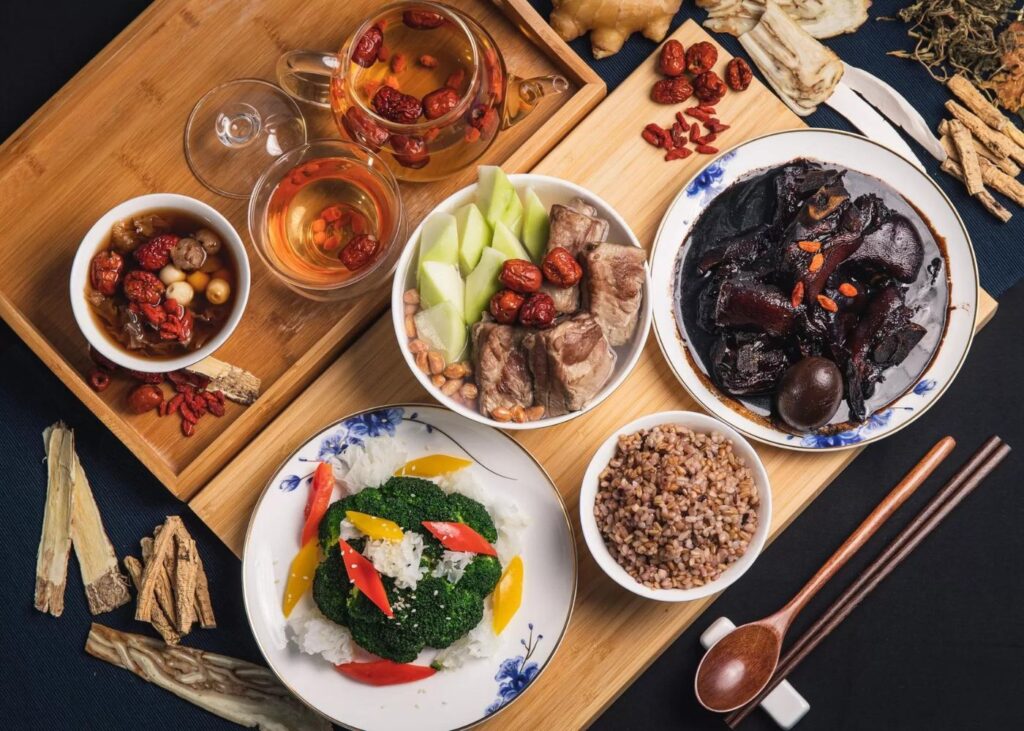
The confinement diet is perhaps the most distinctive and carefully preserved aspect of Chinese postpartum care. According to TCM practitioners, what a mother consumes during this period significantly impacts her recovery trajectory and future health. This isn’t simply about caloric intake—it’s a sophisticated nutritional system designed to heal, restore, and prevent specific postpartum conditions. The confinement diet is specifically crafted to support new mums and new parents during the crucial recovery period after childbirth.
隔离饮食遵循几项基本原则:
- 热 “和 “冷 “特性的平衡– 不是温度,而是食物的能量性质
- 养血补气 – 优先选择补充元气的食物
- 促进泌乳–包括可促进乳汁分泌的半乳促进剂
- 消化支持– 易于吸收的营养成分,不会对正在恢复的消化系统造成负担
- 消炎作用–减少产后炎症的草药和食物
基本禁闭食品
禁闭饮食通常包括
- 生姜麻油鸡– 这是一道暖身菜肴,据说能消除体内的 “风”,同时提供蛋白质和必需脂肪酸。生姜被认为是禁闭期间最重要的治疗食材之一。
- 黑醋猪蹄– 这道富含钙质的菜肴将猪蹄中的胶原蛋白、鸡蛋中的铁和矿物质与甜黑醋炖在一起。它对强化骨骼和关节尤为重要。
- 红枣龙眼茶–这种甜饮料含有红枣和龙眼,据说这两种水果都能增加血流量,改善血液循环,同时提供天然甜味。
- 木瓜鱼汤–鲜鱼可提供瘦肉蛋白质,而木瓜被认为可促进乳汁分泌。这种组合有助于泌乳并提供欧米伽-3 脂肪酸。
- 乌鸡药膳汤–乌鸡(乌骨鸡)因含铁量高而备受推崇,通常与当归等药材搭配使用以补血。
- 肝脏和肾脏菜肴– 内脏提供浓缩的铁、B 族维生素和营养素,传统上认为这些营养素能增强母亲体内相应器官的功能。
- 全谷物和米酒– 糙米、小米和少量米酒可提供能量,并被认为能促进血液循环。
禁闭期间应避免的食物
与吃什么同样重要的是,禁闭期间不能吃什么:
- “寒性 “食物– 包括黄瓜、西瓜、绿豆、大多数生蔬菜和柑橘类水果
- 过于辛辣的食物– 辣椒和强烈的香料可能会扰乱消化,影响母乳
- 冷饮– 严禁饮用冰水、冷果汁和冷藏饮料
- 咸味食物–过多的盐分被认为会导致水肿,阻碍伤口愈合
- 特定海鲜品种–有些传统习俗忌食虾、蟹和某些白鱼
现代营养学视角
从现代营养学的角度来看,许多产褥期饮食做法都与合理的产后营养建议相一致。对蛋白质的强调有助于组织修复,富含铁的食物可以解决失血问题,温热、易消化的膳食可以提供舒适和稳定的能量。然而,严格避免水果和蔬菜可能会导致纤维和某些维生素不足。
现在,先进的圈养营养学家建议在尊重传统框架的基础上,加入轻度烹饪的蔬菜和室温水果,以确保营养均衡。关键在于在确保全面营养支持的同时,保持加温原则。
在亚裔人口众多的城市,专业的膳食配送服务已变得十分流行。这些服务将传统食谱与现代营养科学相结合,为希望遵守饮食传统的家庭提供了便捷的解决方案,同时又避免了复杂的准备工作。
必备煨汤和草药疗法
在中国的坐月子传统中,疗养汤在产后恢复中占据着重要地位。这些汤不是普通的肉汤,而是几百年来针对产后康复的特定方面精心研制的药膳配方。月子汤将蛋白质、蔬菜和药材结合成滋补汤剂,易于消化,并能被恢复中的身体迅速吸收。
中医认为,这些汤品首先是药物,其次才是食物。每种成分都有其治疗作用,它们的组合可平衡人体能量、支持器官功能,并满足产后的特殊需求,如补血、产乳和子宫愈合。
治疗禁闭汤
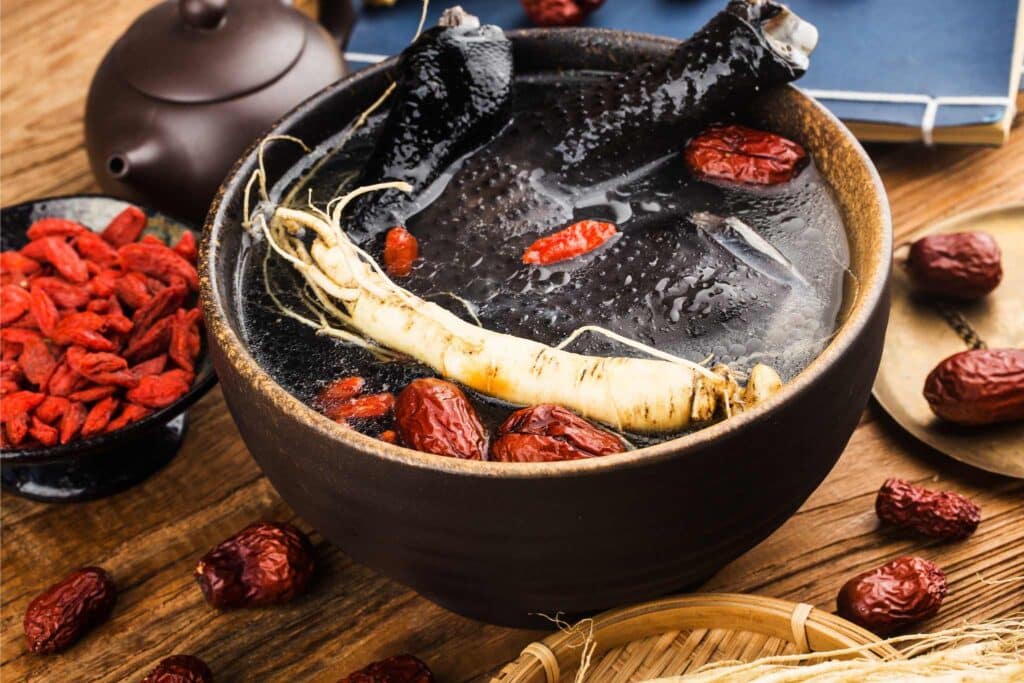
- 生化汤– 一种产后基本疗法,含有当归、川芎、桃仁和其他药材。通常在产后立即饮用此汤,以促进血液循环、减少淤积并促进淤血排出。
- 乌鸡当归汤–乌鸡提供优质蛋白质和铁质,当归具有补血的功效。此外,枸杞、红枣和黄芪等药材还能增强免疫功能和精力。
- 木瓜鱼汤–鲜鱼(通常是鲤鱼或鲈鱼)与青木瓜一起炖煮,青木瓜含有酶,据说能促进乳汁分泌。加入生姜和米酒可使汤温热,防止鱼的 “寒 “性。
- 红枣龙眼茶– 这种甘甜、温暖的饮品结合了红枣、龙眼干和枸杞,具有养血、安神和补充能量的作用。通常在一天的两餐之间饮用。
- 猪肘醋汤–猪肘与鸡蛋一起放入加糖的黑醋中炖煮,可产生一种富含钙质的疗法,据认为可增强在怀孕和分娩期间可能变弱的骨骼和关节。
封闭中的草药配方
除了汤,禁闭还可能包括专门的草药制剂:
- 草药浴– 用艾草、生姜和其他温热的草药浸泡海绵浴或泡脚
- 药酒–少量米酒浸泡在治疗草药中,可促进血液循环
- 药粥– 用食疗药材熬制的米粥,为您提供温和的晨间滋养
- 草药热敷–热敷腹部,促进子宫收缩和愈合
这些药方传统上每天新鲜配制,但在现代实践中,有些药方可以在专门的中医药房买到预先包装好的药方。现在,许多家庭都使用电陶瓷慢炖煲来保持持续、温和的炖煮,以达到最佳的药效萃取效果。
虽然对特定圈养汤的科学研究仍然有限,但对这些食谱中使用的一些草药的药用特性进行了研究。例如,当归在实验室研究中显示出造血(造血)功效,而生姜的消炎功效也是有据可查的。
与坐月子的其他方面一样,根据产妇的体质和具体的恢复需求量身定制的食疗汤最有效。建议向有资质的中医师咨询,特别是对于已有健康问题或正在服药的产妇。
中国囚禁期间的日常活动
产褥期的日常生活节奏刻意遵循一种缓慢的养育模式,将恢复和亲子关系放在首位。与西方育儿初期的混乱不同,中国的产褥期建立了有条不紊的常规生活,消除了新妈妈的决策疲劳,为她们营造了一个可预测的 “茧”。
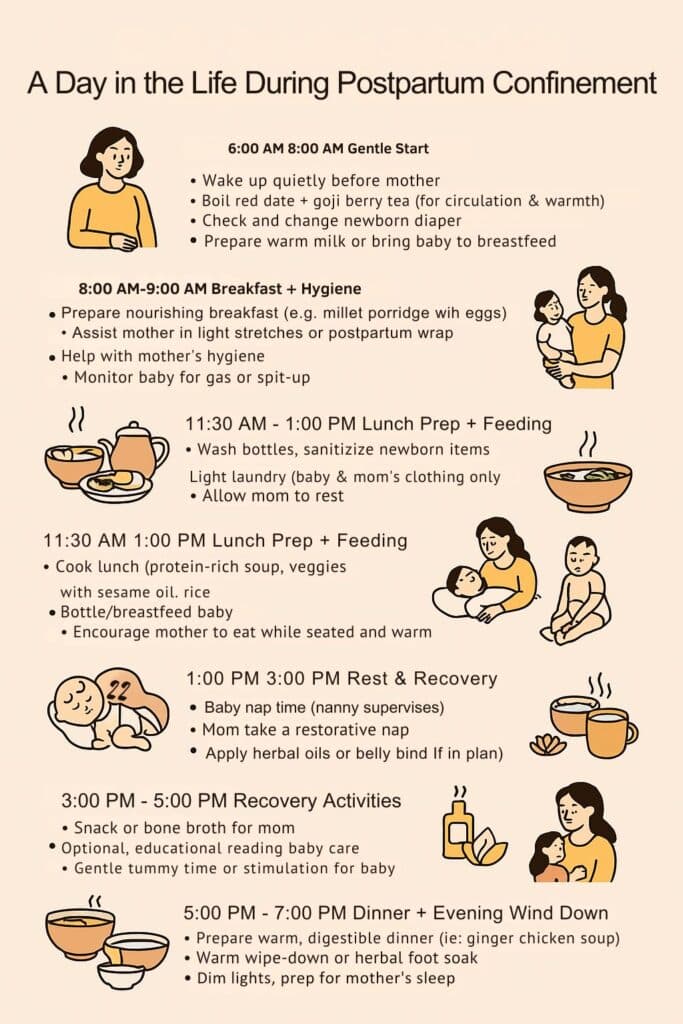
早间例行活动(上午 6:00 – 上午 11:00)
一天的开始通常是母亲喝下第一杯温热的饮料,通常是红枣茶或温和的草药滋补品,送到床边。随后是
- 早晨喂奶– 在护理人员的支持下进行母乳喂养或泵奶
- 轻度清洁–用生姜水或草药浸泡的温毛巾浴
- 营养早餐– 通常是温热的米粥(粥),配以蛋白质,如鸡丝、肝丝或鸡蛋
- 第一道草药汤–专为早晨补充能量和血液而设计的药汤
- 轻微活动–在室内进行非常有限的伸展或行走(第一周后更为常见)
下午例行活动(上午 11:00 – 下午 5:00)
中午主要是补充营养和休息:
- 丰盛的午餐–通常是一天中最丰盛的一餐,以温热的蛋白质、煮熟的蔬菜和米饭为主
- 休息时间–在护理员照顾婴儿期间小睡片刻
- 下午喂食环节–注意正确姿势的母乳喂养或泵奶
- 小点心– 坚果、干果或少量适合禁闭的食物
- 探视时间非常有限– 如果允许探视,通常仅限于直系亲属探视
晚间作息时间(下午 5:00 – 晚上 10:00)
傍晚的过渡强调的是 “收心”:
- 早晚餐– 热身餐,通常以汤为主,添加蛋白质
- 晚间草药滋补品– 专为夜间疗养而设的配方
- 温和卫生– 温毛巾清洁、草药坐浴或部分浸浴
- 宝宝亲子时间–睡前肌肤接触和喂食
- 早睡–在宝宝的第一个长身体期优先保证最大限度的睡眠
通宵支持

Traditional confinement support includes overnight care so the mother can maximize her rest. The caregiver typically:
- 负责换尿布,只在喂奶时把婴儿抱到妈妈身边
- 提供夜宵,为夜间喂食补充能量
- 保持室内温度适宜
- 确保母亲始终被罩着,免受气流侵袭
在所有日常活动中,有几项原则始终不变:
- 保暖– 母亲穿好袜子,必要时戴上帽子,并穿上合适的衣服
- 体力消耗最小化–严格限制体力消耗,上下床需要他人协助
- 补充水分– 定期提供温水、凉茶和汤水
- 有限的屏幕时间– 传统的禁闭限制了阅读和屏幕使用,以防止眼睛疲劳
- 情绪平静– 环境保持安静、平和,没有紧张的讨论
按照西方的标准,这种高度结构化的方法可能显得有些限制性,但许多经历过适当分娩的母亲都表示,在脆弱的生命过渡时期,她们感受到了深深的养育和保护。这种常规方式为初为人父、人母的沉重责任提供了缓冲,使她们能够集中精力进行康复,逐步适应为人母的生活。
传统的 “可为 “与 “不可为”:了解规则
中式坐月子有一整套世代相传的准则。对于不熟悉这一传统的人来说,有些规则可能显得不同寻常甚至极端,但每条规则都有其目的,都植根于对产后生理的传统理解。现代医生通常会根据当前的保健知识和个人情况对这些规则进行调整。
传统做法

- 始终保持温暖– 身体,尤其是头部、脚部和腹部,要盖好被子
- 摄入温热的食物和饮料– 所摄入的食物和饮料至少应为室温,最好是温热的
- 穿袜子和拖鞋– 保护双脚免受冰冷地板的伤害
- 包扎腹部–许多传统习俗使用特殊的产后裹布来支撑腹部器官
- 大量休息– 为愈合和产奶储备能量
- 接受帮助– 允许他人处理家务和支持婴儿护理工作
- 经常进食– 每隔几小时进食少量营养餐,有助于恢复和哺乳
- 练习正确的姿势– 采用有助于子宫愈合的坐姿和躺姿
传统禁忌
- 不要洗澡或洗头– 传统上至少 7-10 天内避免洗澡或洗头(现代替代方法:快速温水淋浴,并立即擦干和加温)。
- 不要让自己暴露在气流或风中– 关好窗户,避免使用风扇或空调
- 不要喝冷水– 只喝室温或温热的饮料
- 不要大量阅读书籍或使用数码设备–据说会使眼睛疲劳,影响肝气
- 不要哭泣– 情绪低落被认为会损伤元气,导致未来的眼疾
- 不要性交– 建议在整个禁闭期间禁欲
- 不要提重物– 预防子宫脱垂,支持盆底康复
- 不要外出– 传统上,母亲们整个月都呆在室内
规则背后的逻辑
了解禁闭规则背后的原因,有助于家庭在知情的情况下决定应遵守哪些规则:
- 保暖–中医认为产后身体易受寒冷侵袭,会导致关节疼痛和日后的健康问题
- 强制执行休息– 许多规则的主要功能是确保在关键愈合期间完全休息
- 预防感染– 某些做法(如限制访客)符合现代人对降低感染风险的理解
- 注重康复– 限制阅读和技术,为身心康复创造空间
现代改编
当代的从业者通常会通过以下方式修改传统规则:
- 卫生习惯– 温水淋浴并立即擦干,而不是避免洗澡
- 轻柔运动–轻度散步和促进血液循环的基本产后运动
- 均衡饮食– 包括一些轻度烹饪的蔬菜,以补充纤维和维生素
- 精神刺激–允许有限的阅读和屏幕时间,以促进情感健康
- 新鲜空气–在适当天气下短暂接触间接室外空气
最有效的方法是将尊重传统智慧与根据个人健康状况灵活处理相结合。与既了解传统习俗又了解现代孕产妇保健知识的医生合作,可以帮助家庭了解哪些规则需要严格遵守,哪些需要修改。
寻找并与中国保姆合作
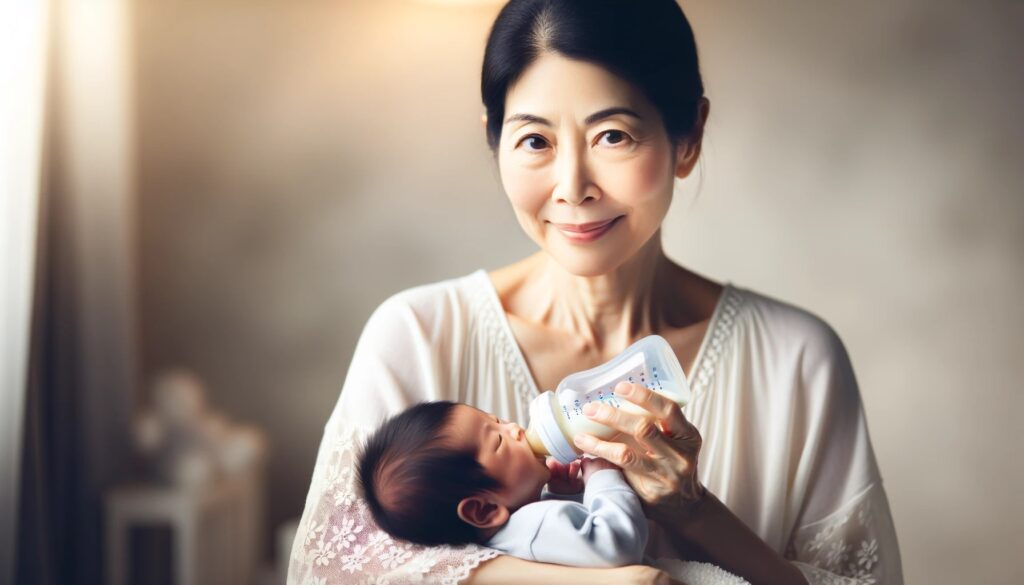
A key component of traditional confinement is the support of a specialized caregiver known as a yue sao (月嫂) or confinement nanny. These professionals combine practical skills in newborn care with deep knowledge of postpartum traditions, herbal cooking, and maternal support. For many families, hiring a confinement nanny represents a significant investment in the mother’s recovery and the baby’s early development.
禁闭室保姆的工作
越秀的综合作用通常包括
- 专业烹饪–根据中医原理准备所有的禁闭餐、补品和中药汤剂
- 新生儿护理– 喂养支持、洗澡、换尿布和监测婴儿的健康状况
- 产妇护理– 协助采取舒适措施、乳房护理和产后恢复
- 洗衣管理– 婴儿用品和母亲衣物的清洗和消毒
- 传统疗法– 药浴、腹部包裹和其他文化习俗
- 知识传授– 向父母传授基本的婴儿护理技能和产后恢复技巧
- 情感支持–提供经验丰富的指导,克服早期养育子女的挑战
寻找合格的禁闭保姆
要找到合适的粤菜,需要提前规划和仔细考虑:
- 尽早开始–在怀孕后三个月开始寻找,因为最好的保姆通常会提前几个月就被预订了
- Use reliable sources – Seek recommendations from friends, family, or reputable postpartum agencies such as My Asian Nanny
- 核实证书– 检查认证、培训和健康检查
- 进行访谈– 讨论经验、新生儿护理方法和烹饪能力
- 明确期望–明确饮食偏好、育儿理念和家规
- 查看推荐信–向以前的客户了解他们的经历
典型安排和费用
隔离保姆服务的结构和价格各不相同:
- 住家服务–最传统的安排,保姆住在家中,提供全天候支持
- 全面保障– 为婴儿和母亲提供 24/7全天候护理
- 可选膳食服务 –为妈妈提供悦食和传统产后膳食的附加服务
- Duration options – The standard length is 30 days, but many families choose 40 or even 100 days depending on recovery needs and cultural preferences. Medical complications, C-section births, or nursing challenges may require a longer period of support.
中国囚禁的现代改编
Zuo yuezi, or “sitting the month,” is a traditional Chinese postpartum recovery practice spanning approximately 30-40 days after childbirth. This ancient tradition, dating back thousands of years, has evolved to meet contemporary needs while preserving its core principles of rest, restoration, and maternal care.
In today’s fast-paced world, modern Chinese women both at home and abroad are finding innovative ways to honor this cultural tradition while adapting it to fit their lifestyles and beliefs. Many now incorporate evidence-based medical practices alongside traditional wisdom, creating a hybrid approach that honors heritage while embracing contemporary healthcare advances. Unlike in high income countries, where postpartum care guidelines often emphasize early mobilization, patient-centered care, and discourage strict confinement, Chinese practices maintain a focus on rest and specific dietary regimens. These differences highlight how postpartum care varies not only between China and high income countries, but also among other cultures with their own unique traditions.
Professional confinement services have emerged as a booming industry, offering everything from in-home confinement nannies (yue sao) to luxurious confinement centers providing hotel-like accommodations with specialized care. Apps and online platforms connect new mothers with certified confinement specialists, meal delivery services, and virtual support communities. Postpartum practices can differ significantly in different countries, with regions such as Latin America, East Asia, and Africa each having their own customs and guidelines for maternal care.
地区差异和文化差异
虽然核心原则相同,但东亚和东南亚各国的监禁做法却大相径庭:
中国大陆:通常遵循更严格的传统规则,强调避免寒冷元素,食用姜、米酒和骨头汤等温性食物。与南方地区相比,北方地区的禁闭时间通常较长。
台湾:非常重视产后专门膳食计划,在传统食材中加入科学均衡的营养。现代化的产房在这里尤其受欢迎。
Hong Kong and Singapore: Often feature a blend of Chinese and Western practices. Professional confinement nannies are common, and practices tend to be more flexible regarding restrictions.
马来西亚华人社区:将姜黄和柠檬草等当地草药和配料融入传统的中国禁忌食谱,创造出独特的融合方法。
西方侨民:生活在西方国家的华人家庭通常会对习俗进行重大调整,注重专门营养和避免寒冷等关键要素,同时摒弃一些更为严格的身体限制。
为禁闭做准备:清单
分娩前六个月
- 如果需要,研究并面试禁闭保姆或中心
- 囤积圈养草药、红枣和专用配料
- 根据封闭原则准备冷藏餐
一个月前
- 安排家庭支持(家庭成员或雇工)
- 购买合适的宽松舒适的服装
- 在家中设置舒适的恢复空间
交货周:
- 与家人或送餐服务机构确定用餐计划
- 用保温瓶准备热饮(红枣茶、姜水
- 建立通信系统,在恢复期间提供支持
在现代中拥抱传统
中式坐月子是世界上历史最悠久的产后传统之一。无论是祖母们传承下来的,还是现代护理服务提供的,它都反映了对新妈妈所需:营养、休息、温暖和关怀的深刻理解。
完全或部分地接受这一传统,你就迈出了全面康复和尊重他人的步伐。身体已经发生了神奇的变化。它值得被善待。心灵也需要空间来调整、反思和强化。禁闭为所有这些提供了一个容器。
如果您计划分娩,请考虑在产后护理计划中列出您的偏好。与您的伴侣或护理人员进行清晰的沟通。选择一位了解您的目标的月嫂、朵拉或支持团队。最重要的是,倾听您身体的声音–让传统为您的康复服务,而不是阻碍它。
Emotional Support During Confinement
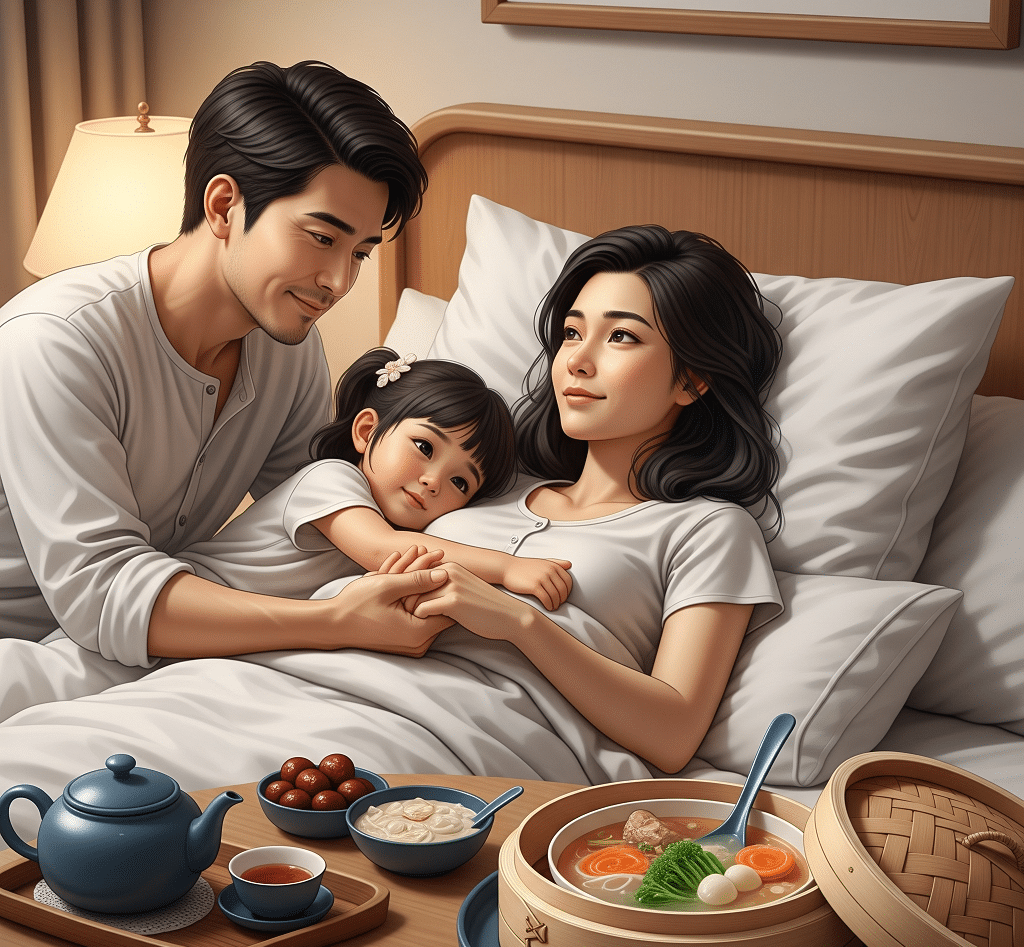
Emotional support is a cornerstone of traditional Chinese confinement practices, playing a vital role in the well-being of new mothers during the postpartum period. In addition to physical recovery, the confinement period is a time when new mothers are especially vulnerable to emotional ups and downs, including postpartum depression and anxiety. Chinese confinement practices recognize this need by fostering a nurturing environment where family members, a confinement nanny, or a postpartum doula provide not only practical help but also emotional care.
A confinement nanny or postpartum doula is often trained to offer reassurance, listen to concerns, and help new mothers adjust to the demands of caring for a newborn baby. In many families, the mother-in-law or other close relatives take on the responsibility of supporting the new mother, ensuring she feels valued and cared for. This emotional support can make a significant difference, helping new mothers feel less isolated and more confident as they navigate the challenges of early motherhood.
Every new mother’s needs are unique, and some may require more emotional support than others. Open communication with family members and caregivers is essential to ensure that the new mother’s emotional needs are met. By prioritizing emotional well-being alongside physical recovery, traditional Chinese confinement helps new mothers build a strong foundation for both themselves and their babies during this transformative time.
Common Challenges and How to Overcome Them
While traditional Chinese confinement practices offer many benefits, new mothers may encounter several challenges during the confinement period. One of the most common difficulties is adhering to strict dietary guidelines, which can sometimes feel overwhelming or restrictive. To make this aspect of postpartum confinement more manageable, new mothers can consult with lactation consultants or healthcare providers who understand Chinese postpartum confinement, ensuring that nutritional needs are met without unnecessary stress.
Another challenge is the limited physical activity often prescribed during the confinement period. While rest is important, a complete lack of movement can lead to muscle weakness and reduced blood circulation. Incorporating gentle physical activity, such as light stretching, yoga, or tai chi, can help maintain health and support recovery, as long as these exercises are tailored to the mother’s condition and approved by a healthcare professional.
Feelings of isolation and loneliness are also common, especially when new mothers spend extended periods indoors. Staying connected with family members, friends, or other new mothers through phone calls, video chats, or online support groups can help combat these feelings and provide much-needed encouragement. By acknowledging these challenges and seeking support, new mothers can make the most of their confinement period, focusing on both their physical and emotional well-being.
Support for New Moms
Support is essential for new mothers during the confinement period, and traditional practices in Chinese and other Asian cultures place a strong emphasis on community and family involvement. In addition to emotional care, practical assistance with household chores, childcare, and meal preparation allows new mothers to rest and recover fully. A confinement nanny or postpartum doula can be invaluable, taking on daily responsibilities so the new mother can focus on her own health and her newborn baby.
Family members, especially the mother-in-law, often play a central role in providing guidance and support, drawing on traditional practices to ensure the well-being of both mother and baby. In modern times, online resources such as blogs, forums, and social media groups offer new mothers opportunities to connect with others who are experiencing similar challenges, creating a sense of community even when physical support may be limited.
By recognizing the importance of both practical and emotional support, families can help new mothers navigate the postpartum period with greater confidence and resilience. Whether through traditional practices or modern resources, ensuring that new mothers feel supported is key to their health, well-being, and successful transition into motherhood.
